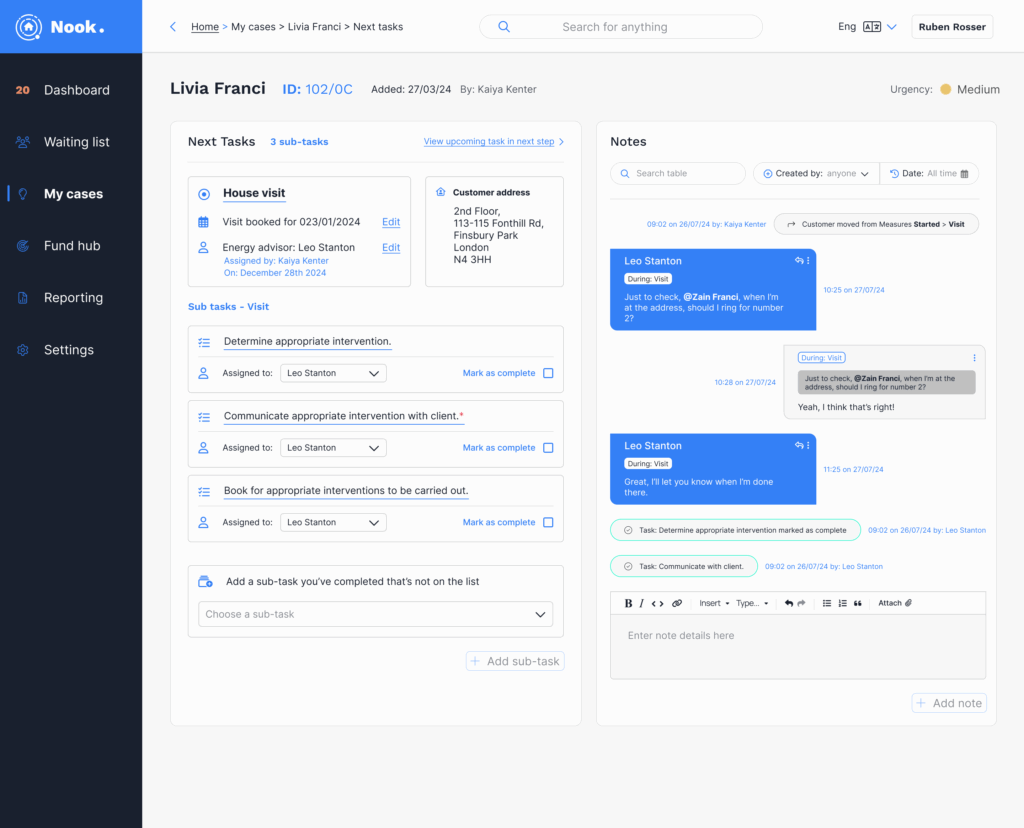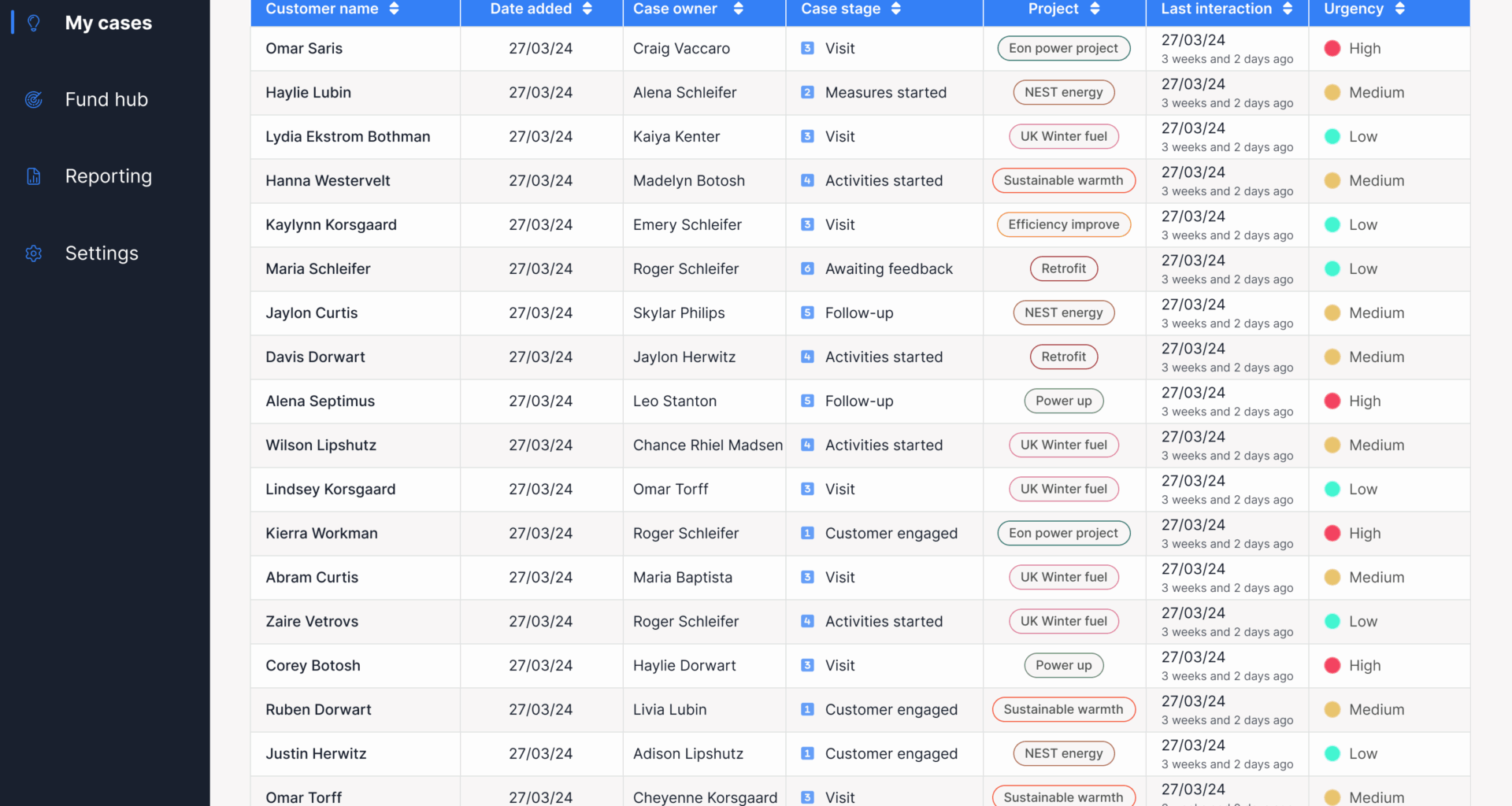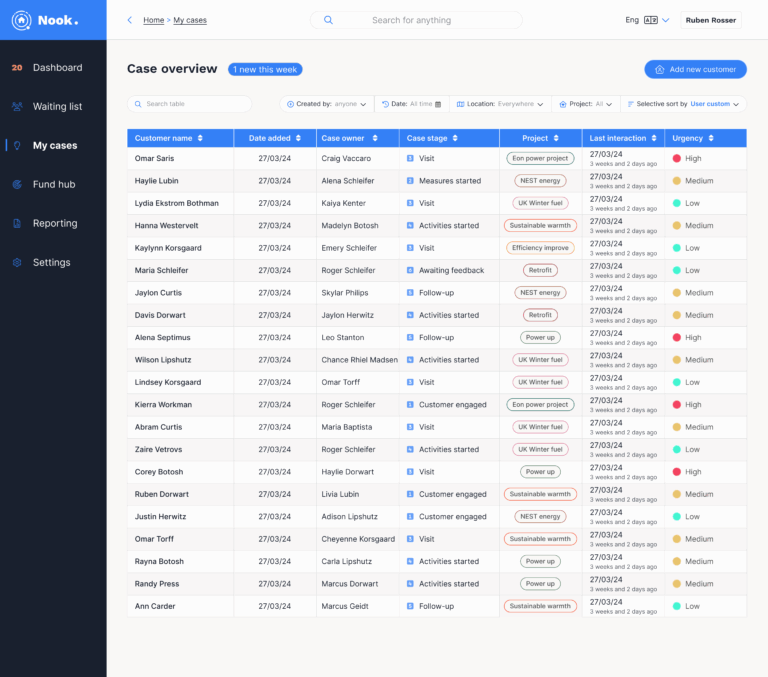A new case management tool for community energy groups
In 2023, Outlandish secured substantial funding from the Energy Industry Voluntary Redress Scheme to develop an open-source client relationship and case management tool for the community energy sector, with a focus on addressing fuel poverty and providing energy-saving advice.
Why do community energy groups need a dedicated CRM?
Prior to this point, we’d heard from community energy teams that groups were struggling to track their customer interactions, stay informed about the measures taken to help them, and use this information to complete their reporting to funders.
Many groups were either using proprietary tools (Airtable, Dynamics), which are not suited to community energy needs and are hard to customise, or they were relying on spreadsheets to record their work with local residents.
However, as we know, spreadsheets are brittle: groups’ data was prone to accidental erasure, and their reporting formulae were prone to breaking; the software itself would start lagging when the cases or rows reached their hundreds; and spreadsheets didn’t easily allow them to record a narrative on a case as it developed.
Our solution
We designed and built a new tool, Nook,as a rich extension on top of CiviCRM, a popular open-source option.
Co-designed with energy advisors themselves, Nook helps advisors to capture case information, manage their organisation’s workflow and speed up their reporting.
User research sessions, design sprint workshops with energy groups, prototyping and testing – all of this was undertaken with energy advisors to ensure a strong fit to the groups’ needs. (You can read more about the learnings from this process on the Nook project documentation site.)
As a result, some key features of Nook include:
- Default customer data fields, out of the box, that meet the needs of the community energy sector, plus extensive custom data fields
- Customer ‘list’ views and ‘Kanban/card style’ views for case tracking and workflow overviews
- Custom case workflows, each with their own stages and team tasks – because every organisation has a different process
- Automated task creation as cases move through the system. Accepted a referral? Moving that referred case to the next step auto-creates a home visit task (for instance)
- Reporting at a project level, case level, or intervention level
- All data can be exported – whatever groups put in can be extracted
- Internal messaging and task assignment
- File upload
- And lots and lots of customisation options

Standalone CRMs, sharing updates
We also built new infrastructure: each group gets a hosted, standalone ‘instance’ of the tool – the data of each group is totally separated, and each organisation can have a unique configuration.
They also benefit from being part of a network: we build new features and updates, and make them available to all the groups in the network.
And if a group doesn’t want Outlandish to host their instance? That’s fine too – the project is open source, and Nook can be set up and self-hosted with a bit of Civi knowledge. Meanwhile, at Outlandish we’ll continue to push improvements back to the open-source Nook project.

Taking Civi further
We took CiviCRM and we both radically extended and refined it.
CiviCRM is a great tool, but it suffers from a bloated feature set – with far more than any energy group might need. And out of the box, it has a terribly unintuitive user interface. It’s a sad fact that Civi’s default ‘look’ is very off-putting to new users.
In response, we stripped out the cruft and the yuck and spent a lot of time building an attractive, sleek UI. We designed a switchable Kanban-style visualisation of the cases as they progress through the CRM, similar to Trello. We also built a new sidebar navigation, which may seem minor, but is entirely new to CiviCRM and makes the entire tool a lot more usable.
And if you’re familiar with Civi already, we’ve heard that Nook’s ability to track and manage interactions between the team and contacts in the platform is a significant improvement over CiviCase.

Nook rollout and next steps
We’re excited to say that at the time of writing, we’re entering a pilot phase, welcoming our first community energy groups to trial Nook. Currently, our developers are assisting them in setting up their initial configurations.
We are also moving into a new phase to:
- extend the reporting functionality, saving groups even more time when it comes to reporting and funders’ changing requirements
- automate CO2 and energy savings calculations
- add reporting templates
- build strategic tools for community energy group managers
- and more!
It’s a very, very exciting time.
Community energy group? Please let us know if you would like to be involved.
If you think Nook could benefit your community energy group, follow the link to the Nook homepage, and reach out to us for a conversation: nook@outlandish.com
Civi developer? Want to contribute to the project?
We’ve published the code for Nook here. We’re also starting to think about how we might involve the developer community. If you’d like to have a chat about some ideas, reach out to the team at nook@outlandish.com










